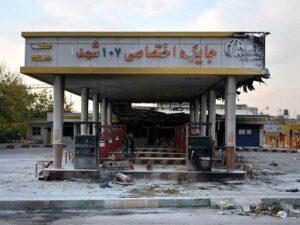
Most Iranians remain cut off from internet for fourth day as rights groups condemn government for brutal crackdown
Iran’s Supreme Leader Ayatollah Ali Khamenei and President Hassan Rouhani have declared victory over “enemies” in response to deadly protests across Iran that were ignited by a sudden increase in fuel prices last week.
“The Iranian nation achieved another victory in the recent historic test. They demonstrated that even if they have some economic problems and some complaints about the country’s management, they will never play into the enemy’s hands,” Mr Rouhani said on Wednesday.
Amnesty International has documented at least 106 deaths in 21 cities across the country. Unconfirmed activist reports have put the death toll at 200.
Prominent Iranian opposition figure, Abolfazl Ghadyani, issued a statement saying the Supreme Leader is responsible for the rise in fuel prices and its consequences.
Mr Ghadyani added that the country’s economic policies are pressuring the poor and have brought the economy to a dead-end.
Most Iranians remain cut off from the internet for the fourth day as human rights groups have condemned the government for the online blackout.
“By severing Iranians from global internet connectivity, the authorities are hoping to hide their bloody crackdown on their own people from the rest of the world.” said Michael Page, deputy director of Middle East and North Africa at Human Rights Watch.
Iranian authorities have made new arrests in connection with violent protests, including “criminals” and “major leaders” of the protests, the state media reported.
Fars news agency that is close to the Revolutionary Guards, reported that dual national Iranians are among those arrested.
The reports added that German, Turkish and Afghan dual nationals had been trained and funded by foreign services to destroy infrastructure.
There are also reports of university student activists being arrested in Tehran and Sanandaj.
“The heavy-handedness of the Iranian government’s crackdown on the current protests was surprising, especially after their reaction to the 2017-18 protests when the leadership legitimised protester demands,” said Dina Esfandiary, a fellow at Harvard University and the Century Foundation.
“Today, they’re making the calculation that these protests are not as significant as 2009, are leaderless and that the population is weak,” Ms Esfandiary told The Independent.
The Swiss Ambassador in Tehran, who also represents US interests in Iran, has been summoned to the Iranian foreign ministry.
Iranian officials have accused the US government of meddling in the country’s internal affairs.
Mohsen Milani, director of the Centre for Strategic and Diplomatic Studies at the University of South Florida told The Independent: “The government must address the legitimate demands of the protestors who appear tierd of pervasive corruption, rampant inflation, high unemployment, and the mismanagement of the economy —problems that have been accentuated as the result of US unilateral sanctions on Iran.”
The French foreign ministry on Wednesday expressed deep concern over reports of the deaths of many protesters and called on Iran “to respect its international human rights obligations.”
Iranian media reported that over a dozen gas stations and more than 70 banks were set on fire by protesters.
INDEPENDENT
Negar Mortazavi Washington @NegarMortazavi












 Posted in
Posted in 











